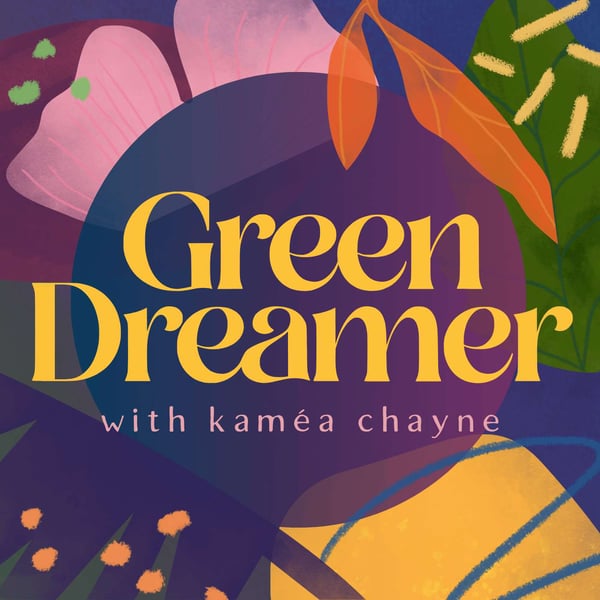103) Why we need a prevention-based solution to plastic and microplastic pollution with 5 Gyres Institute's Dr. Marcus Eriksen
Green Dreamer: Seeding change towards collective healing, sustainability, regeneration
kaméa chayne
4.9 • 661 Ratings
🗓️ 15 January 2019
⏱️ 38 minutes
🧾️ Download transcript
Summary
Why are plastic pieces so problematic when they end up in our oceans? How can focusing on preventative solutions to tackling plastic and micro-plastic pollution help us to more effectively address this global issue?
Sharing his wisdom here is Dr. Marcus Eriksen, Co-founder and Research Director of 5 Gyres Institute. In this episode, you’ll hear about his research on microplastic pollution leading to the passing of our federal Microbead-Free Waters Act of 2015; why he thinks we need to focus more on stopping plastic from entering our waterways in the first place instead of on cleaning up plastics already in our oceans; and more. Let’s dive in.
HIGHLIGHTS
[4:21] Marcus discusses his active deployment in the Gulf War and how seeing the ecological impact of war affected him.
[5:30] Marcus: "I've got to preserve and conserve the world around me. That's my duty; that's what's worth fighting for."
[8:16] How the 5 Gyres Institute fought for (and won) the Microbead-Free Waters Act of 2015.
[14:07] Marcus speaks on the linear waste system and how that system needs to change into a circular system.
[25:45] How the burden of pollution has changed from resting on the consumers' shoulders alone to consumers sharing the load with corporations.
[27:19] Kamea: "It's important for us all to also know that we all have to work together. It's consumers; it's businesses; it's governments. We have to all collaborate with each other."
Thanks for bringing your light! Find the full show notes with links and resources at www.greendreamer.com/103, subscribe to our newsletter to win monthly giveaways, and share your #1 takeaway from the episode tagging our featured guest and me @KameaChayne to spread the light and to let us know you're tuning in!
Transcript
Click on a timestamp to play from that location
| 0:00.0 | Hey there, this is your host, Kamea. I hope you had a restful holiday season and that your start to this new year has been all of the things that you might need during this time. |
| 0:11.7 | As we move deeper into 2025, first of all, I'm so excited to share the many conversations we already have in the pipeline for you this season. |
| 0:20.5 | So definitely stay tuned |
| 0:22.2 | and make sure you're subscribed to my Substack newsletter, which you can find at camilla.substack.com. |
| 0:29.9 | And I also just want to share that our call for your direct support continues as well, because |
| 0:34.7 | independent media is more important than ever, and every contribution, |
| 0:39.4 | no matter how small or large, really helps us out so much. So if you haven't already, we invite |
| 0:45.0 | you to join our Patreon or Substack membership or contribute a gift of any amount at |
| 0:50.5 | greendreamer.com slash support. If you need a planner for the new year, |
| 0:55.5 | you can also check out our fundraising green dreamer planners |
| 0:58.7 | at greendreamer.com slash shop. |
| 1:01.8 | Thank you so, so much for whatever forms of support |
| 1:05.1 | you're able to share with us. |
| 1:06.9 | For now, enjoy the show. |
| 1:09.8 | That was the misconception 10 years ago when folks thought that there was islands of trash in the oceans. |
| 1:15.5 | Not anymore. |
| 1:16.6 | It's all about prevention. |
| 1:17.9 | That's where the hard work is. |
| 1:19.2 | And it's hard work. |
| 1:20.5 | And we need no more movement drift, but the movement to focus, all of us, all hands on deck, to stop the flow of trash |
| 1:29.0 | and land to sea. |
| 1:32.5 | Why are plastic pieces so problematic when they end up in our oceans? |
... |
Please login to see the full transcript.
Disclaimer: The podcast and artwork embedded on this page are from kaméa chayne, and are the property of its owner and not affiliated with or endorsed by Tapesearch.
Generated transcripts are the property of kaméa chayne and are distributed freely under the Fair Use doctrine. Transcripts generated by Tapesearch are not guaranteed to be accurate.
Copyright © Tapesearch 2025.

